House Extension Cost in 2024
If you’re thinking of adding extra space to your home, the first thing that comes to mind is the price. Unfortunately, if you’re looking for a straight quote for the cost of an extension, you won’t find one. A lot goes into estimating an extension cost because of the sheer number of variables, from the size to the materials.
That said, there are ways to approximate the average cost and that’s exactly what we’re going to do. We’ve put together a comprehensive method for gauging a new extension cost. With our help, you can start assembling a budget and moving forward with your quality extension.
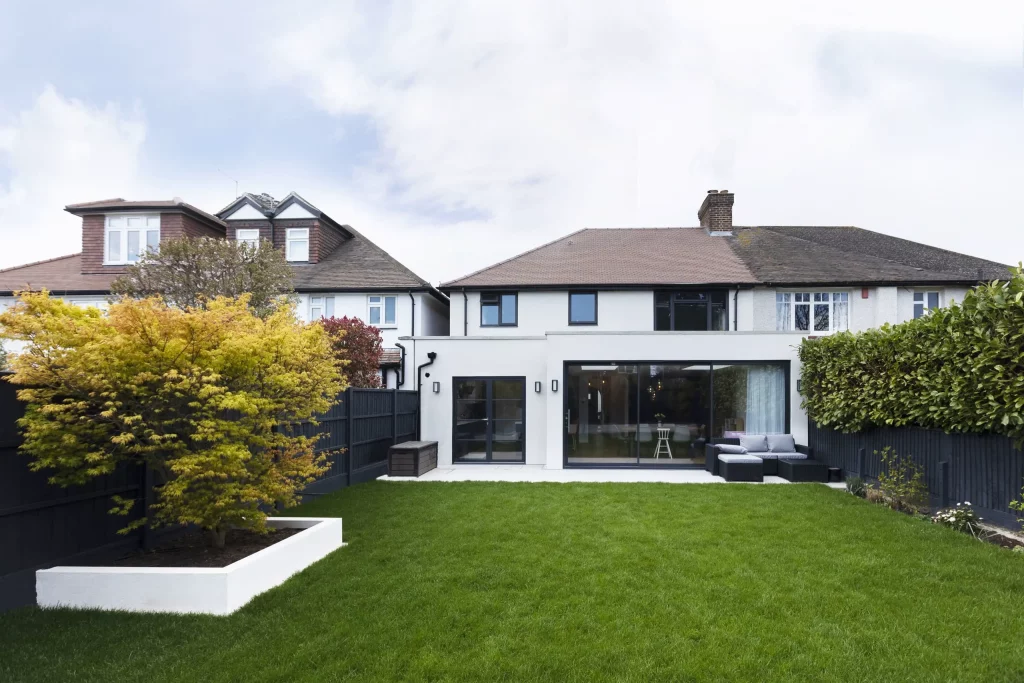
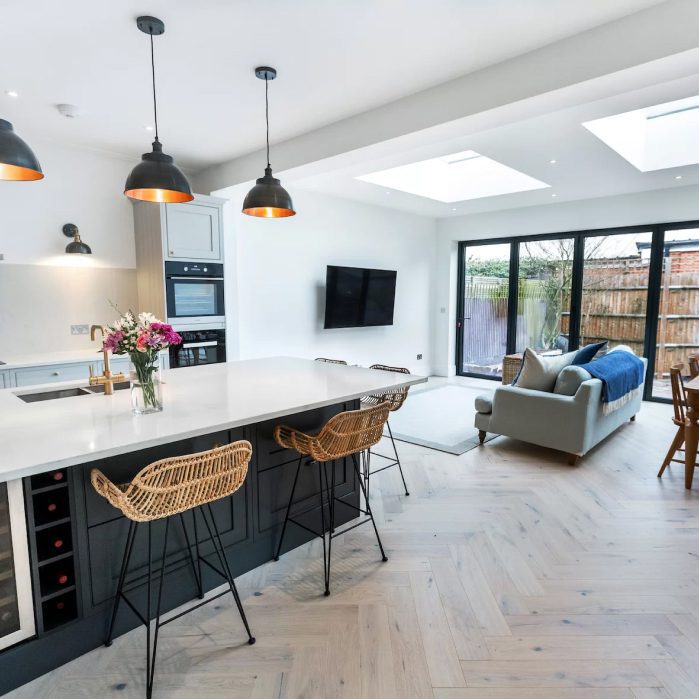
Understanding the Basics of Home Extension Cost
Getting your head around house extension costs is tricky and oftentimes, daunting. So, it’s extremely important to first understand the basics of a home extension cost and to take note of aspects that you may not have thought about before. The basic factors that influence building extension costs include:
- Size and design (e.g. 24m2 garage extension)
- Number of storeys
- Location
- Quality of the foundations
- Whether the extension includes major plumbing (bathroom or kitchen)
- Specialist features, like smart technology, etc.
- Type of windows (e.g. single, double, or triple-glazed)
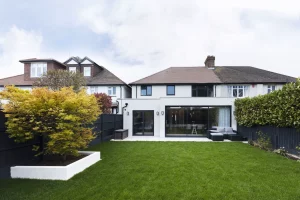
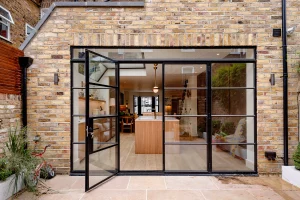
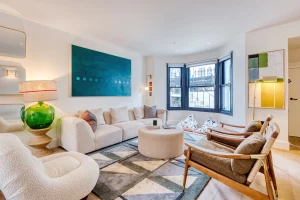
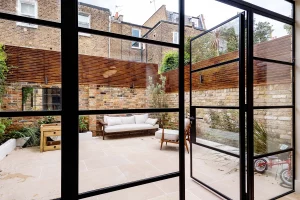
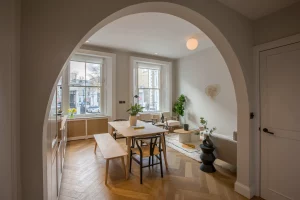
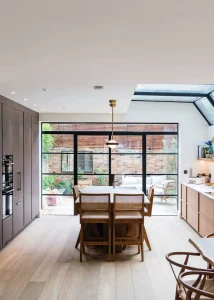
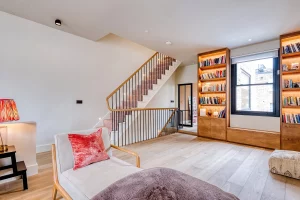
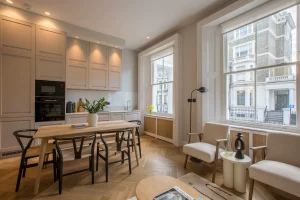
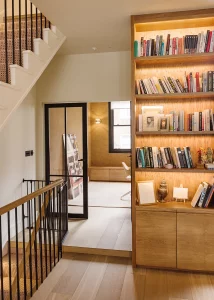
Most of you will be aware of these factors when determining the cost of a house extension in the UK. However, some other crucial expenses that you might not consider are:
- Architectural fees (can cost up to 10% of the total extension price)
- Engineer expenses
- Surveying costs
- Assessment fees, such as tree surveyors or ecology surveyors
- Insurance costs
- Planning permission fees
- VAT
When pricing a house extension, it’s important to be aware of the costs involved in the five key stages of the build.
- Planning stage
- External construction stage
- Internal construction stage
- Interior design stage
- Decorating and final touches stage
Approaching your extension in this way makes the process more digestible, leading to a more comfortable process, especially when it comes to budget.
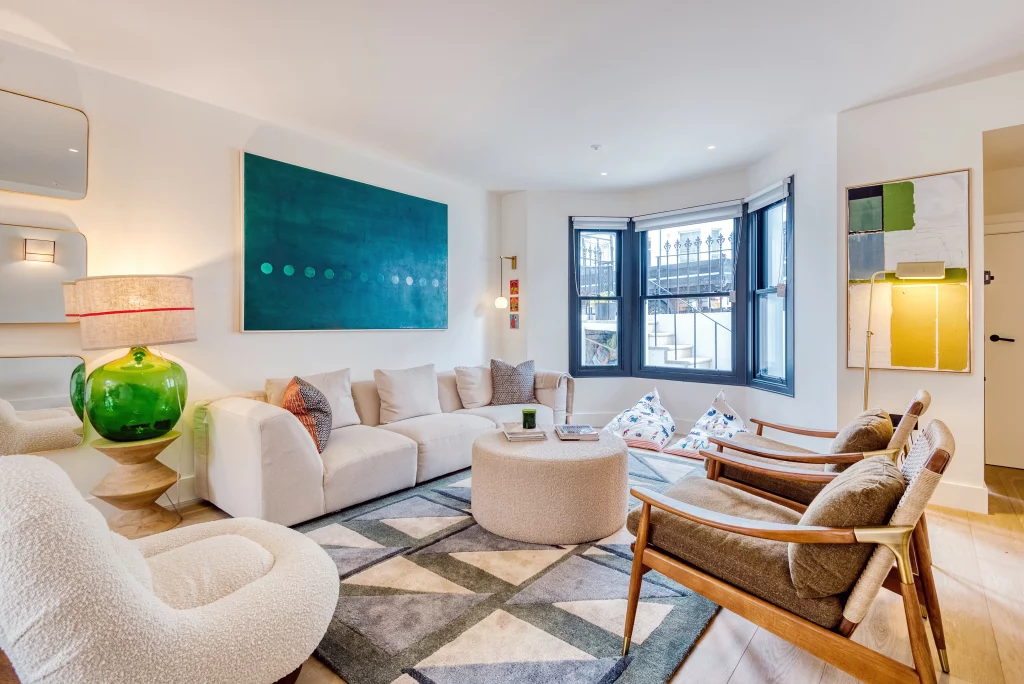
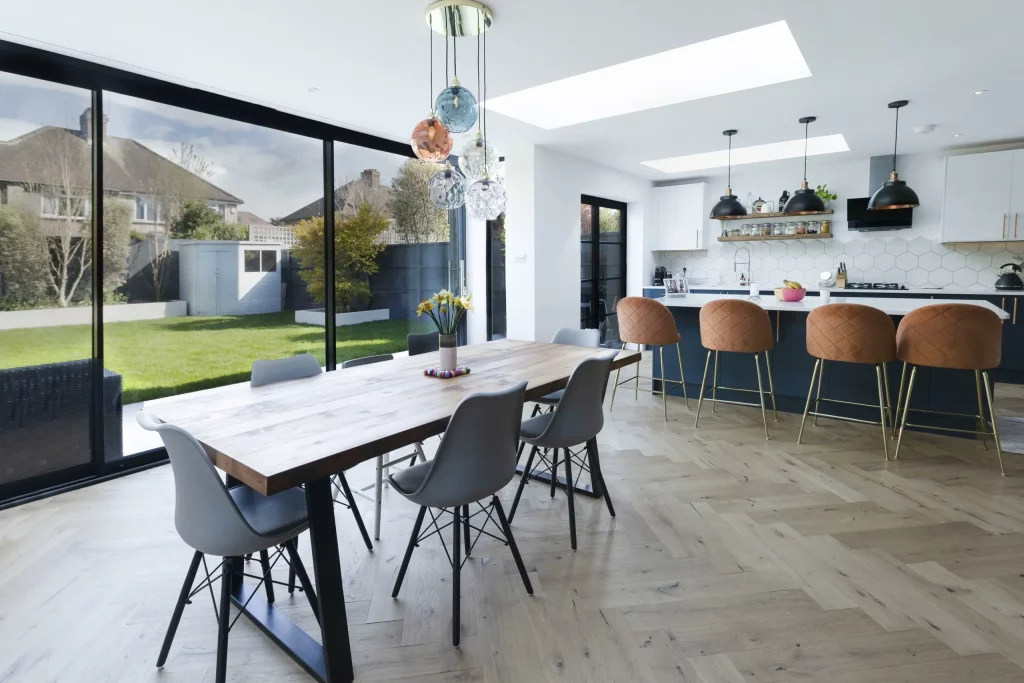
The Importance of Accurate Cost Estimation
Without an accurate house extension cost estimate, you can grossly misjudge the overall price of the project. For example, under-budgeting often causes projects to be put on hold because money runs out. An accurate estimation allows you to make a plan to extend your home and stick to it.
It also helps you to prioritize the most important aspects. For example, you may want a particular external wall finish but the budget isn’t there. So, you might put off this part of the job until you have more money. An accurate cost estimation is a critical starting point.
Key Factors Influencing Extension Costs
We briefly touched on the different things that affect the cost of an extension in the UK. Now, let’s take a detailed look at the most influential factors.
Size and Scale: Impact on Overall Costs
The size and scale of an extension have perhaps the biggest influence over the final price. Compared to small extensions, bigger projects take longer, need additional labour, and require more materials and machinery.
Take a wrap around house extension for example. The L-shape makes it a larger and more complex build than a regular square rear extension, typically adding to the price.
Peculiarities in design may also have an impact. Complex designs tend to be more difficult to build and again, take longer.
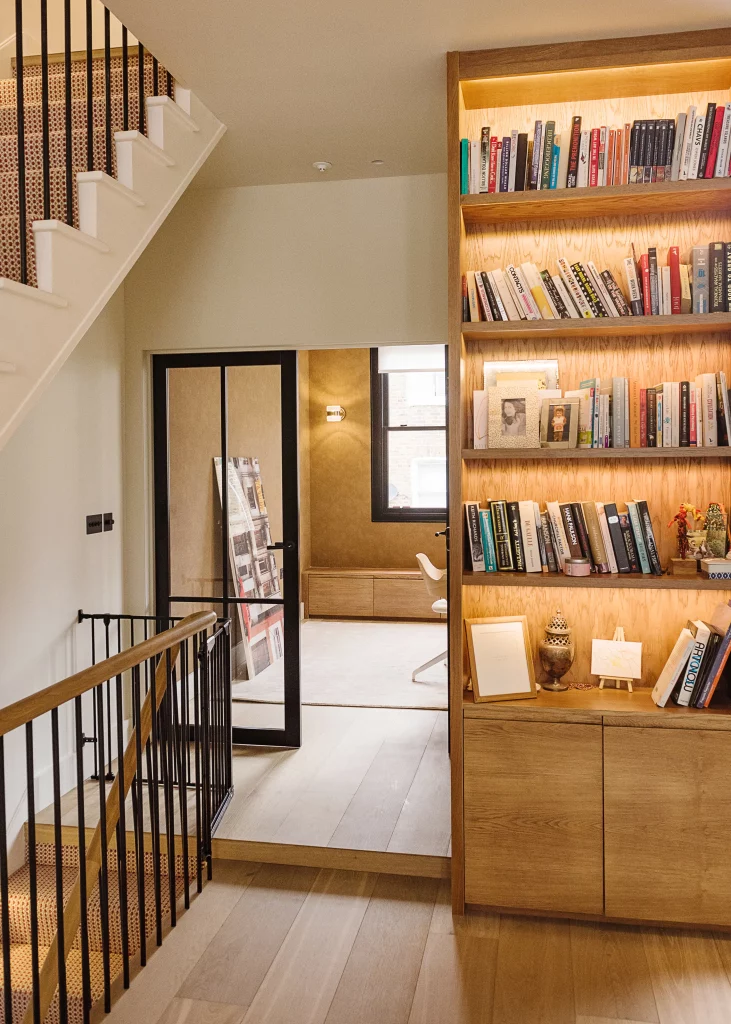
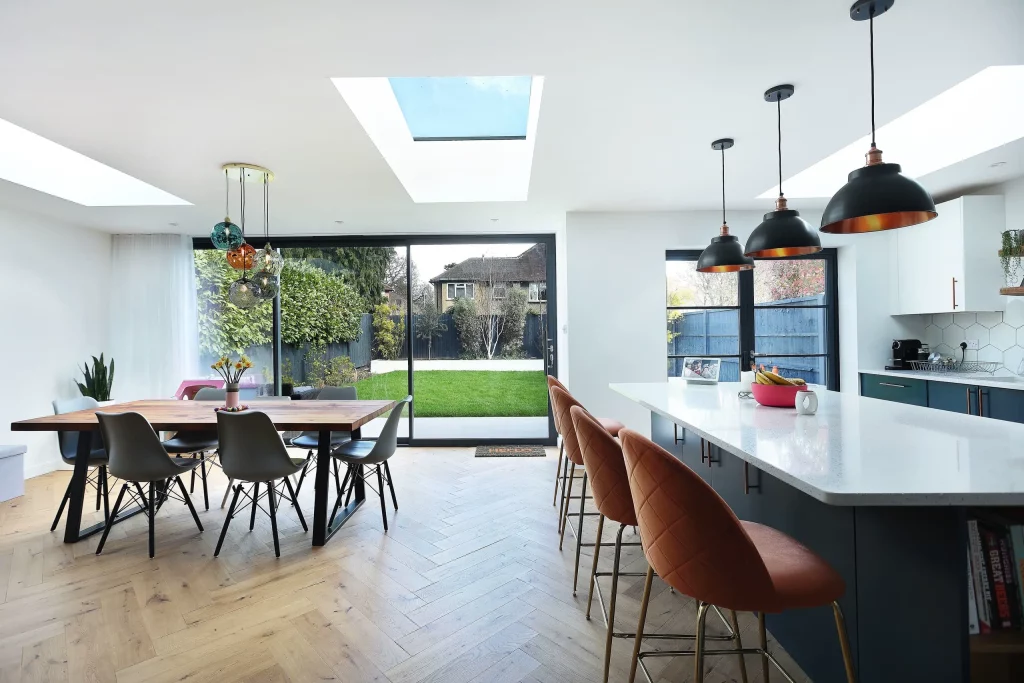
Location Variations: Regional Cost Differences
Just like when you’re buying or renting, location has a significant impact on the cost of extensions. House extensions in London are likely to be more expensive than similar-sized construction projects in smaller towns in other parts of the country.
In locations with higher living costs, labour expenses also tend to be higher. In large cities where there’s a high demand for construction work, there’s a good chance that you’ll have to pay a premium.
Material Choices: Balancing Quality and Cost
Materials and labour are undoubtedly the two biggest costs when building an extension. All extensions require the basics, like concrete, bricks, lumber, and clay. These materials must be sourced and transported to your site, which also contributes to the cost.
Although these types of materials are standard, others aren’t. For example, you may want a particular type of stone or finish on your double storey extension, like limestone. This will come at a higher cost than a painted concrete wall.
The same principle applies to interiors too. Flooring materials can affect the overall cost of a house extension. On a budget, you’ve got to find a balance between the quality of the work and the price.
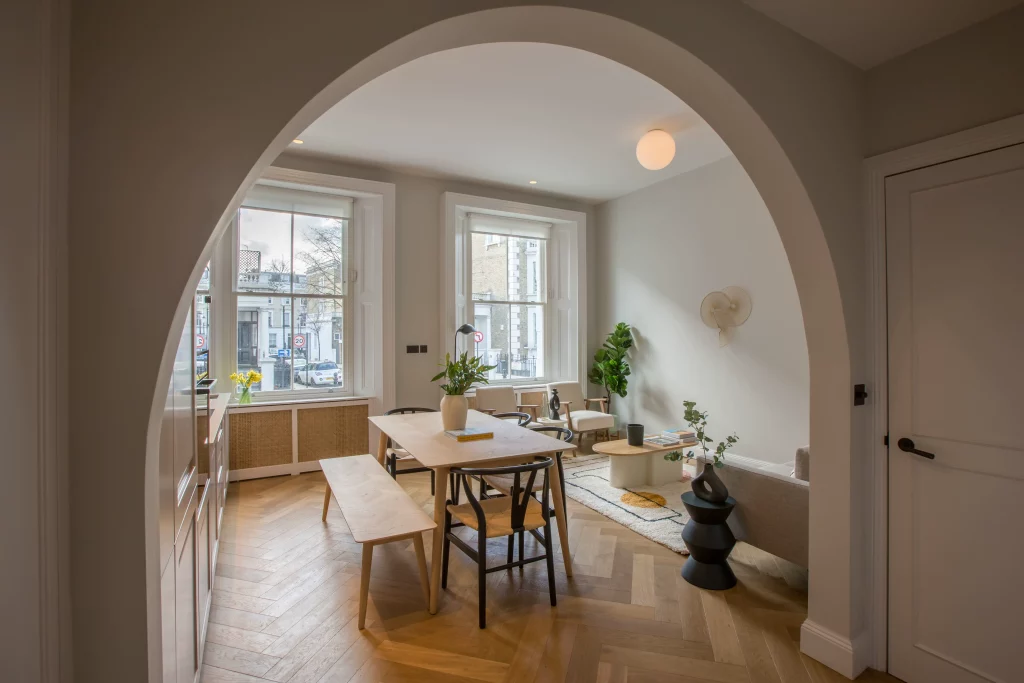
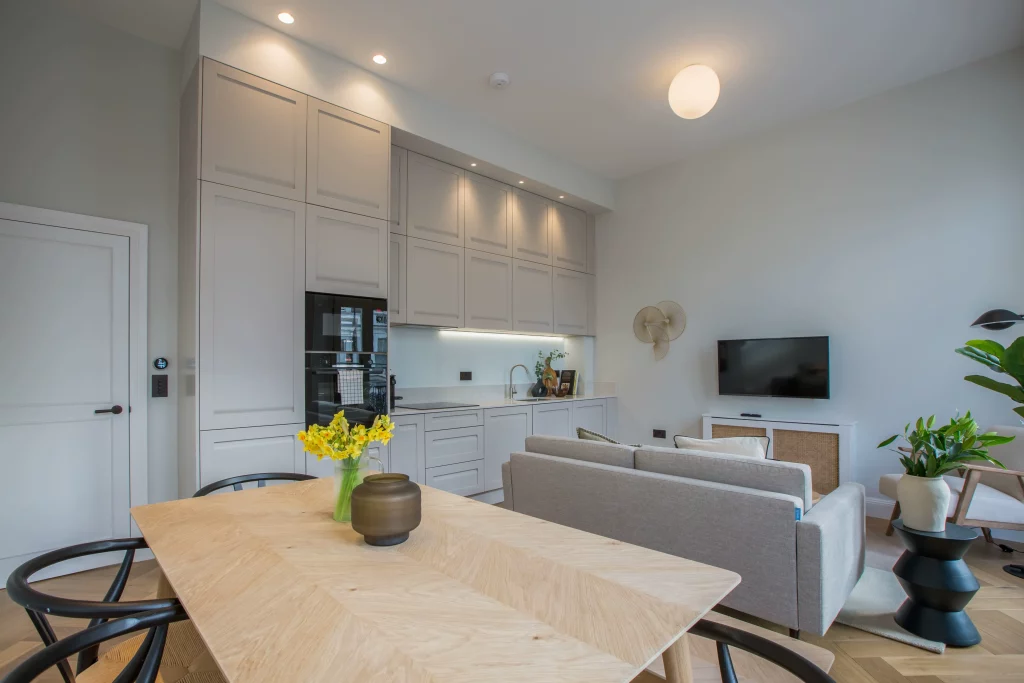
Types of Extensions and Their Costs
To answer the question, “How much does an extension cost?”, you must first determine what type of extension you want. There are several different types of extensions, and depending on the one you go for, the costs can vary significantly.
Small rear extensions are among the most common add-ons in the country. So, to give you an idea of an average extension cost, here’s what you can expect.
Extension Details | Low-Cost | High-Cost | Average Cost |
15m2 Extension Cost | £18,000-£26,000 | £26,000-£40,000 | £22,000-£34,000 |
24m2 Extension Cost | £30,000-£40,000 | £40,000-£55,000 | £35,000-£48,000 |
30m2 Extension Cost | £45,000-£60,000 | £60,000-£75,000 | £52,000-£68,000 |
Not every extension is a small one, however. You can approximate average extension costs in the UK according to their size. Let’s take a look at the costs.
- Small rear extension should cost between £35,000 and £48,000 (see the table above for the breakdown)
- Medium rear extension costs approximately £50,000 to £65,000
- Large rear extension can cost from £65,000 to £100,000 and above
If you know exactly what type of extension you want, it’s easier to get a more accurate price estimation. Here’s a breakdown of the cost of building an extension in the UK according to the construction type. But remember, the pricing can change depending on various aspects, like material selection.
Extension Details | Single Storey Extension | Double Storey Extension | Side Return Extension | Wrap Around Extension |
Small (15-30m2) | £22,000-£68,000 | £25,000-£55,000 | £27,000-£69,000 | £27,000-£65,000 |
Medium (30-40m2) | £40,000-£70,000 | £45,000-£75,000 | £47,000-£78,000 | £47,000-£76,000 |
Large (>40m2) | £50,000-£80,000 | £55,000-£85,000 | £60,000-£100,000 | £60,000-£100,000 |
While you shouldn’t take these figures as quotations, they give you a good indication of how much you’ll need to set aside for your extension.
Single Storey Extensions: A Detailed Cost Analysis
Single storey extensions are the easiest and most common household add-ons. However, the cost of a ground floor extension can still vary significantly. A small, 15m2 could cost as little as £22,000, but you could easily surpass £50,000 with a large one of over 40m2.
The single storey house extension cost per m2 usually falls somewhere between £1,500 and £4,600.
Two Storey Extensions: Investment and Returns
You might not realize that the cost to build an extension that’s two storeys high isn’t necessarily twice the price of a single storey building. Sure, the price of this extension will be higher, but the additional costs usually aren’t excessive.
Along with the first floor, you’ll have to account for the second storey floor joists, walls, interior fixtures, and the roof. Plus, you’ll likely have to cover a fee for scaffolding.
According to our estimations, the cost of building an extension with two storeys is between £25,000 and £85,000. An average two storey (30m2 to 40m2) would be approximately £45,000 to £75,000.
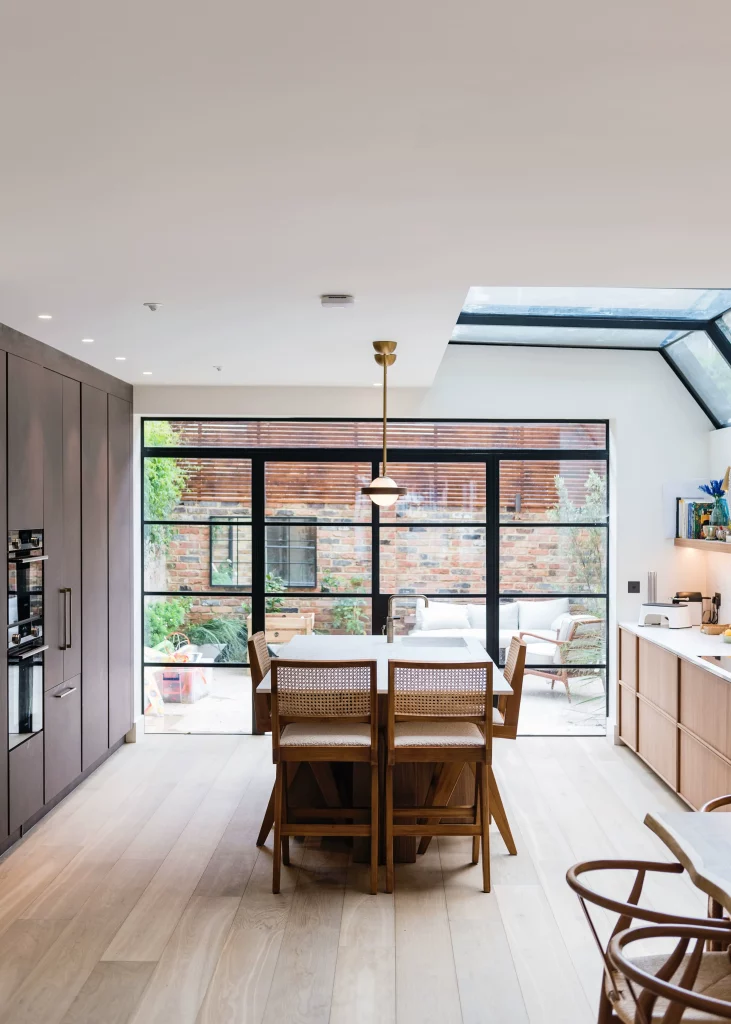
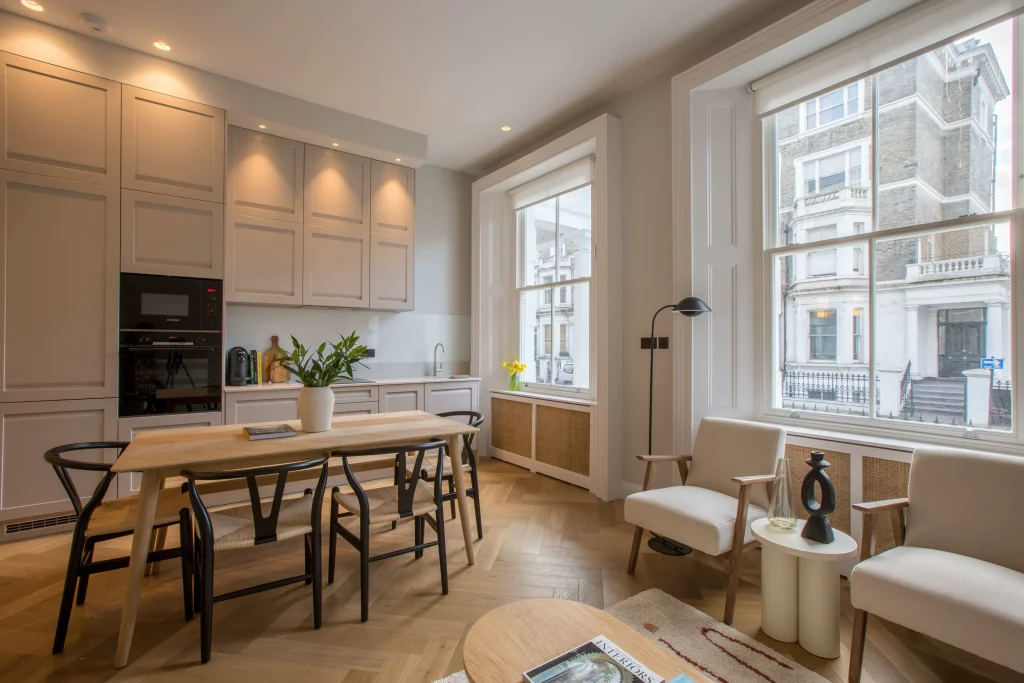
Side Extensions: Maximizing Space Cost-Effectively
A side return extension is similar to a regular rear extension but it’s located on the side of the building rather than at the back. They’re generally built to make an existing room bigger. If you have kitchen extension ideas, a side extension could be right up your alley.
Alternatively, you may be interested in a side extension to build a single office, home gym, or even a conservatory. Side extensions can be more tricky than rear ones because of the location. However, this isn’t always the case. You can build a side extension for the same price as a regular one.
We estimate an average side extension to cost somewhere between £47,000 and £78,000, depending on the complexity of the job.
Conservatories and Orangeries: Affordable Alternatives?
Conservatories and orangeries are nice additions to houses but are not direct alternatives to extensions. Conservatories are generally smaller and contain more glass. They’re often cheaper due to the size and material costs.
Loft Conversions: Transforming Unused Space
If you don’t have the available space to build an extension but you’ve got an attic or elevated ceilings, you may consider transforming this unused space into a loft. Lofts are extremely versatile and can be used in several ways, such as bedrooms, offices, or kids’ playrooms.
Although lofts don’t involve the same building work as extensions, they typically incur significant costs. The main reason for this is that the space has to be temperature-controlled. You can expect to pay between £20,000 and £40,000 for a loft (15m2 to 30m2).
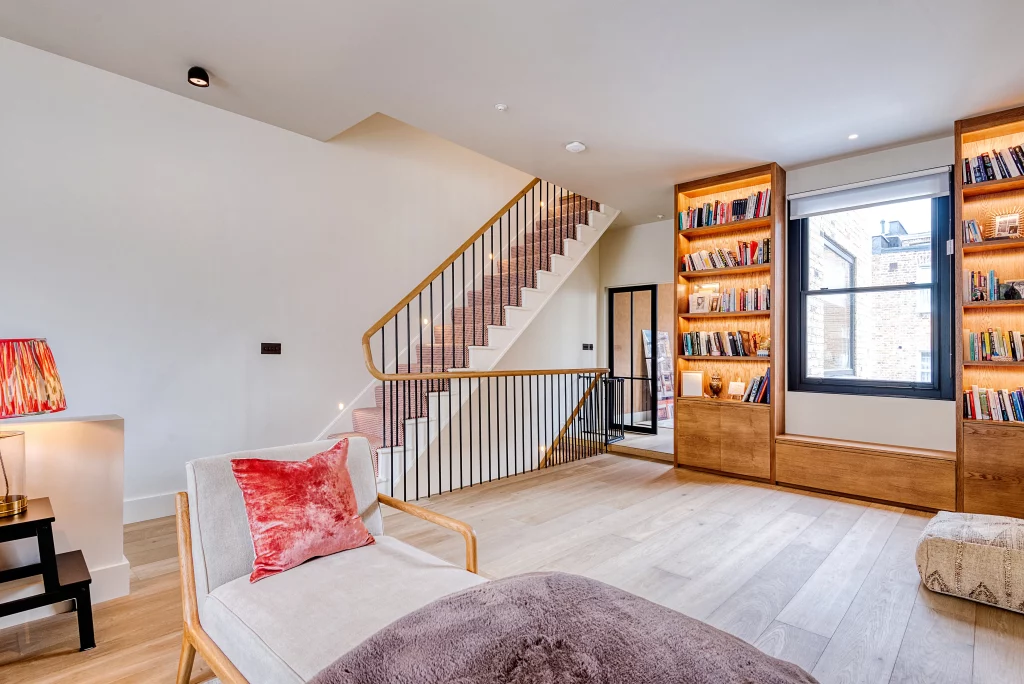
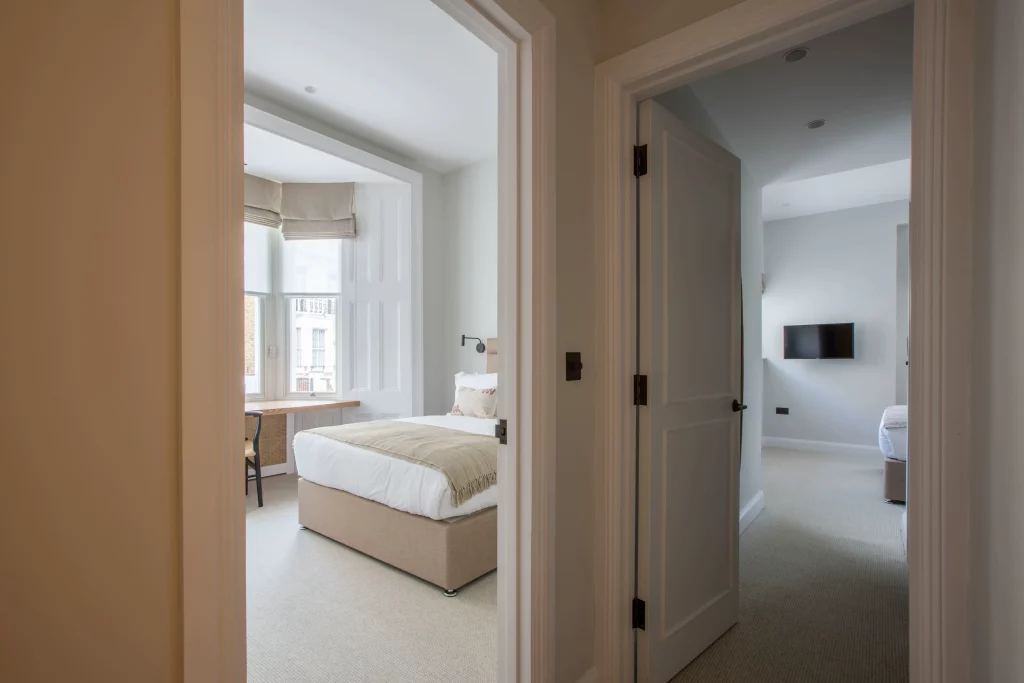
Breaking Down the Costs
By now, you should be well on your way to answering the question, how much do extensions cost? Next, we break down how much your extension will cost to give you a clearer picture of exactly where the money goes.
Architectural and Design Fees Explained
Many homeowners rely on architects to handle their extension design. This approach often streamlines the process and provides you with several design options. However, using an architect will mean your extension plans cost around 8% to 10% of the entire build.
Some architects are open to flat rates so it’s best to shop around to find an architect you like. Alternatively, you can go with a construction company that handles all aspects of the extension, including the design.
Builder and Contractor Costs: What to Expect
Approximately 50% of your extension cost in the UK should go to the builder or contractor. This will cover the cost of labour and the equipment that they use.
However, if you use the contractor for additional services, like design, carpentry, or stonework, you may have to allocate more funds to them.
The building materials take up approximately 40% of the costs on average. Again, if you opt for more expensive materials, this percentage could be higher.
Between the design and planning work, materials, and labour costs, there is 100% of your building costs. But, this doesn’t include interior design and putting the finishing touches.
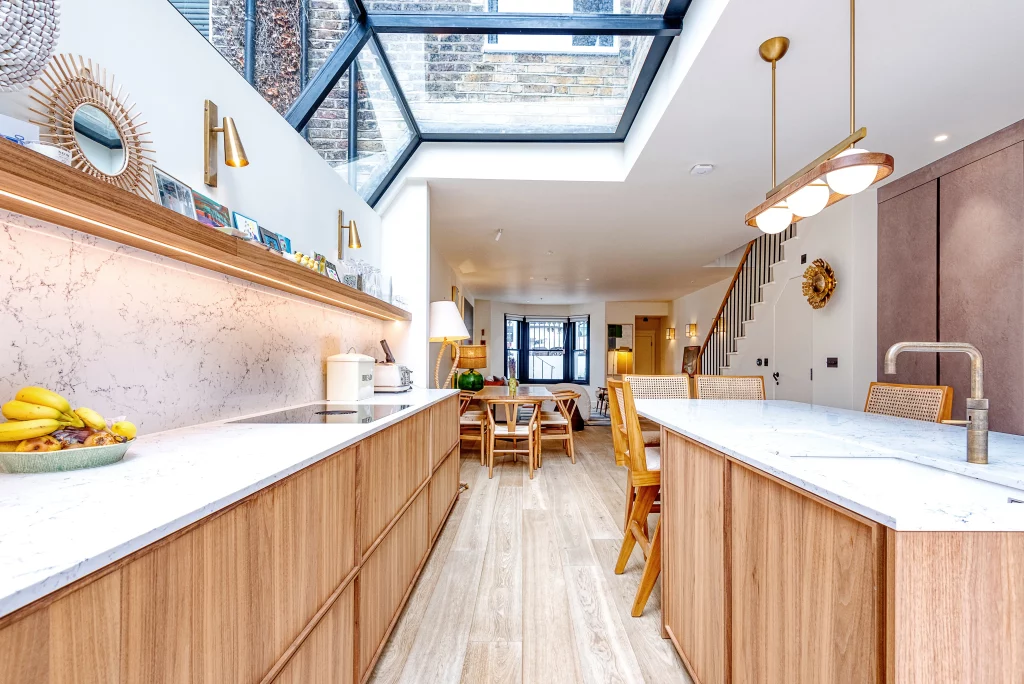

Interior Fit-Out: Finalizing Your Budget
We don’t include the interior design in the build cost because this is where prices can vary. You can essentially spend as much or as little as you want on things like flooring, furniture, countertops, and decorative pieces. It’s important to carefully budget this alongside the build.
Additional Financial Considerations
Even if you’re careful with assessing the cost of a house extension in the UK, it’s easy to forget something and misjudge your budget. So, here are three additional financial considerations that you must pay attention to.
VAT on Extensions: A Cost Guide to Calculations
Builders and tradespeople must charge the standard 20% VAT. However, many of them don’t include VAT in their quotes so make sure to check to avoid an unwanted issue.
You may be able to avail of a reduced VAT rate for energy-conserving products. Be sure to confirm all VAT rates before you finalize your budget and start scheduling work.
Planning Permissions and Legal Fees
Planning permission is typically inexpensive in relation to the total cost of building an extension but it’s still worth including in your budget. You should also consider that it can take several months to clear. In some cases, you may require legal assistance to push it through, adding further costs.
It’s generally a good idea to have a legal professional look over any contracts that are part of the deal. These costs should also be accounted for.
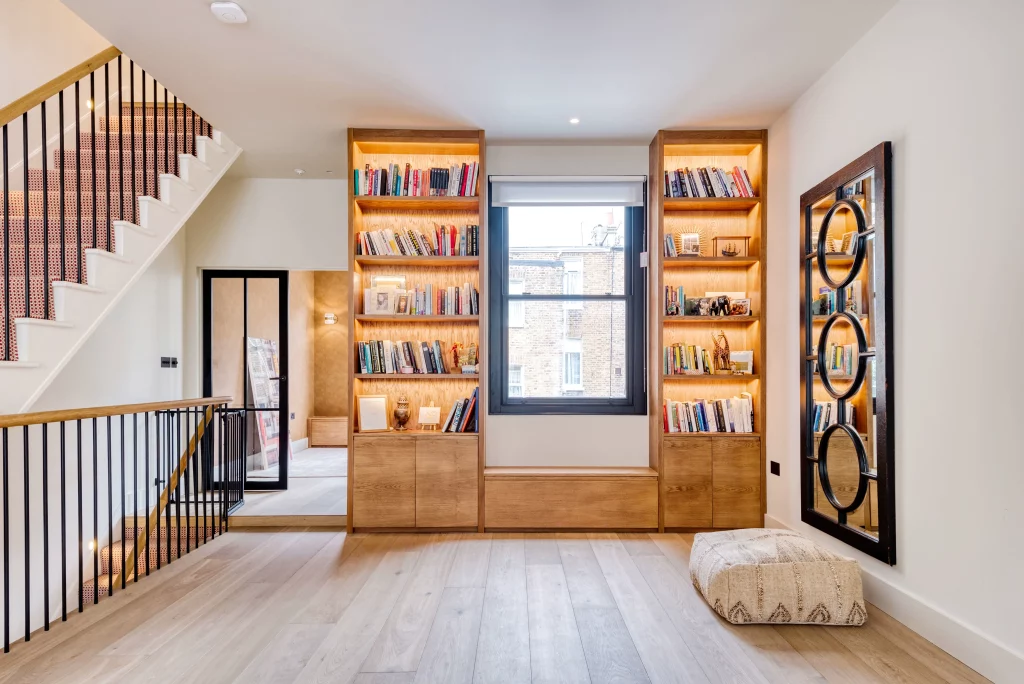
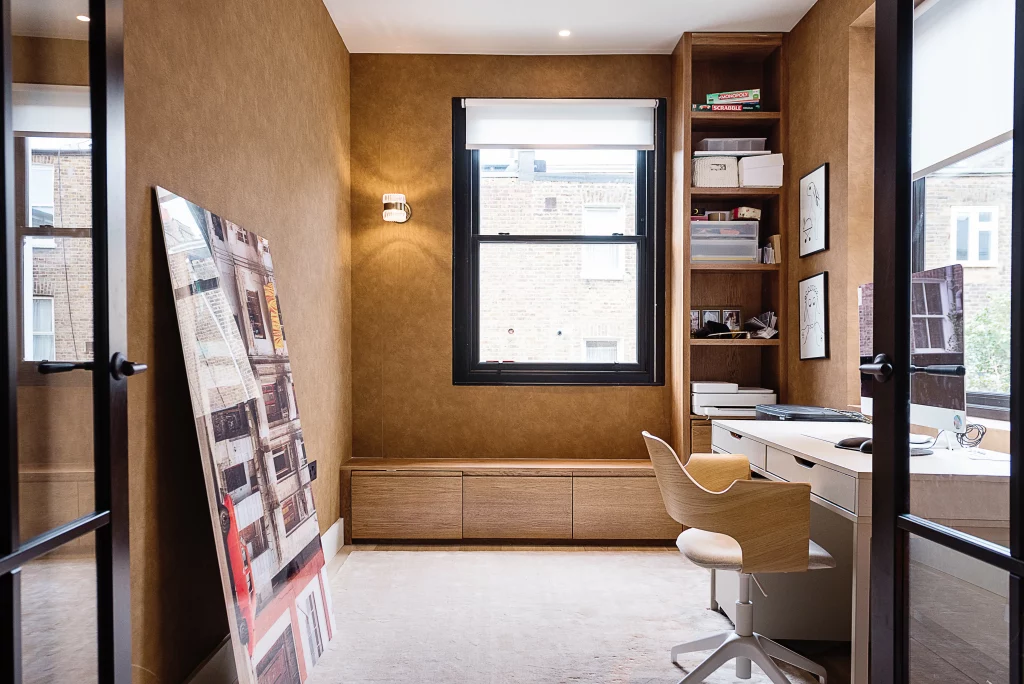
Long-Term Value: Does an Extension Increase Property Value?
Aside from the additional space, the biggest advantage of building an extension is the value it adds to your home. Extensions can increase the value of your property by up to 20%, depending on the type of extension and the size and location of your home.
Expert Insights: How to Save on Your Extension
The cost of an extension is significant but it doesn’t have to cause you financial duress. With the right approach, proper planning, quality builders, and good decision-making, you can shave off a lot of money on your build. Here are our expert insights on how to cut the cost.
Choosing the Right Builders: Fittra's Competitive Edge
Seeing as builders usually account for the biggest chunk of extension costs, choosing the right ones is critical. If you’re London-based, going with an end-to-end building company, like Fittra, should be your first decision.
We’re not only a reputable NHBC-registered building construction company, but we also have long-term partnerships with architects, engineers, consultants, and designers. We can cover every aspect of your extension from the very first step to the last.
DIY and Project Management: Balancing Risks and Rewards
Going the DIY route and personally managing your extension project can save you thousands of pounds in labour and material costs. However, it comes at a big risk and sacrifices a lot of time.
Without experience or expertise, you may walk into several pitfalls, like hiring poor tradespeople, using the wrong materials, or going with a bad design.
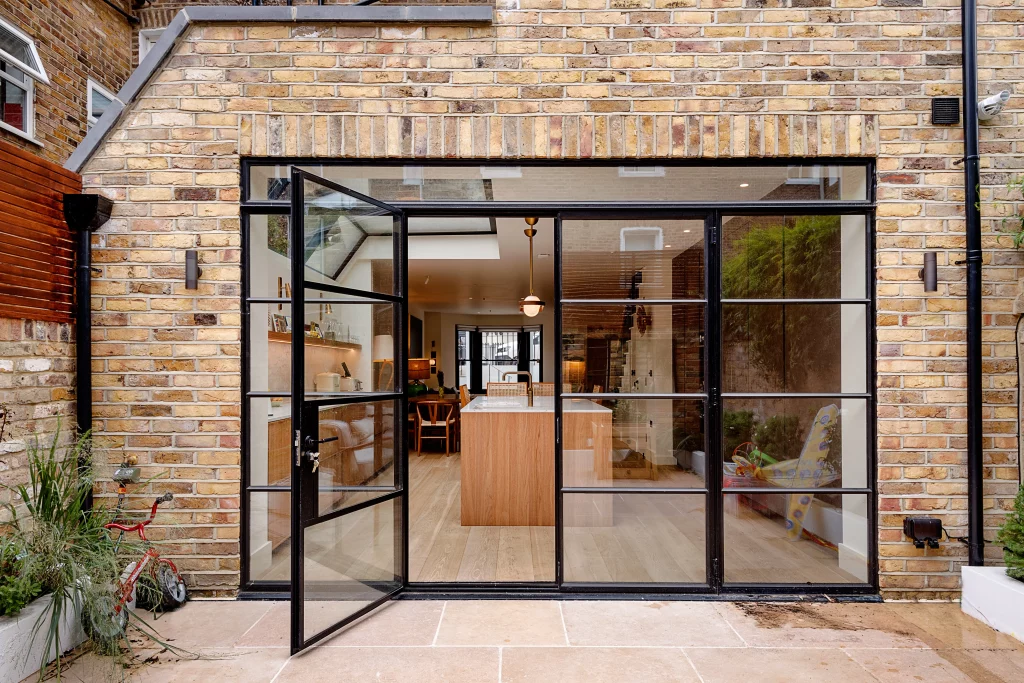

Material Sourcing and Budgeting Tips
One of the most effective ways of reducing your spending is to consider alternative places for sourcing material. There’s a virtually endless conveyor belt of second-hand items that are more than suitable for extensions.
While we don’t necessarily recommend reusing structural items, you can most definitely reuse furniture, wood, doors, etc. Look online or attend a local auction to secure good deals.
Fittra: Your Go-To Construction Company in West London
With over 10 years of experience, Fittra is a quality-first construction company that provides end-to-end solutions for first-time builders and homeowners. Our five-step comprehensive process ensures that you’re fully looked after from the initial meeting to securing warranties upon completion.
Why Choose Fittra for Your Extension Project
There are many reasons to choose Fittra for your upcoming extension project. Here are some factors to consider before you make your decision.
NHBC-Registered with a Decade of Expertise
As an accomplished NHBC-registered company, we’re licensed to provide quality work throughout the UK. We leverage our team of expert builders along with our network of building professionals to ensure clients are satisfied with every project.
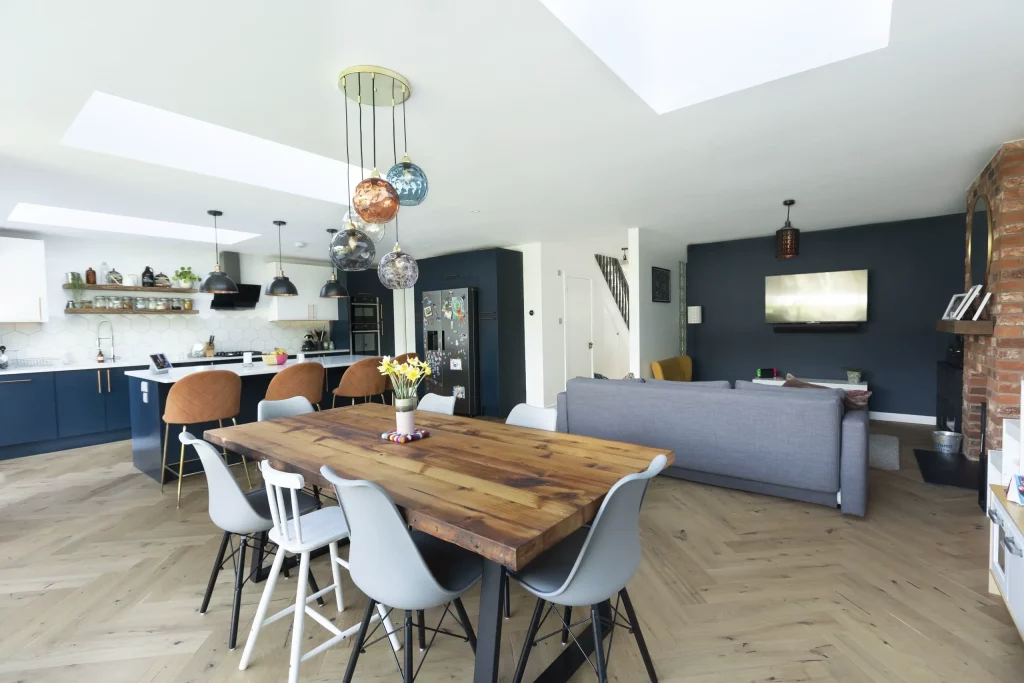
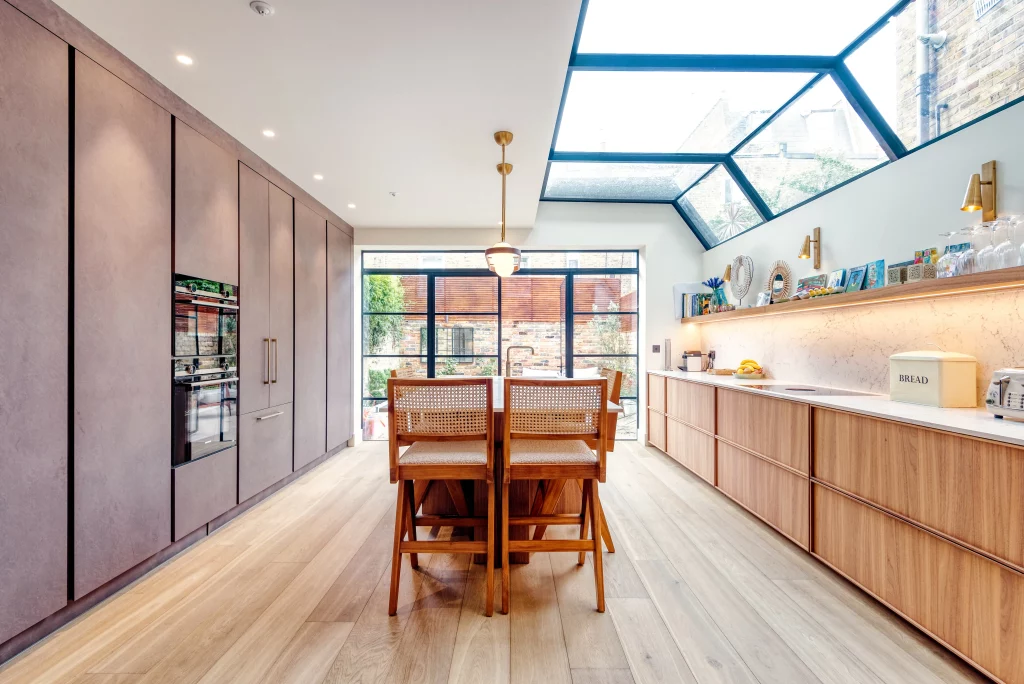
Comprehensive Services from New Builds to Renovations
The Fittra name is renowned for all extension types, loft conversions, and renovations. However, our comprehensive service offerings go far beyond work on existing houses. Our other services include:
- New builds (end-to-end services)
- Household refurbishments
- Commercial buildings
- Development and investment projects
- Window supply and installation
- Door supply and installation
Exclusive Client Advantages: Why Fittra Stands Out
In addition to our experience, reputation, NHBC accreditation, and wide range of services, Fittra has even more to offer. Here are some of the exclusive client advantages you can look forward to when working with us.
- Free consultations throughout the entire process
- Free schedule of works
- In-depth breakdowns of extension costs
- 5% deposit
- Accreditations: NHBC, NFB, FMB, TrustMark, and Considerate Constructors
- A fully integrated team ensures smooth processes
- Contactable at all times
- Trade discounts
- £10 million employer’s liability insurance
- £5 million products and liability insurance
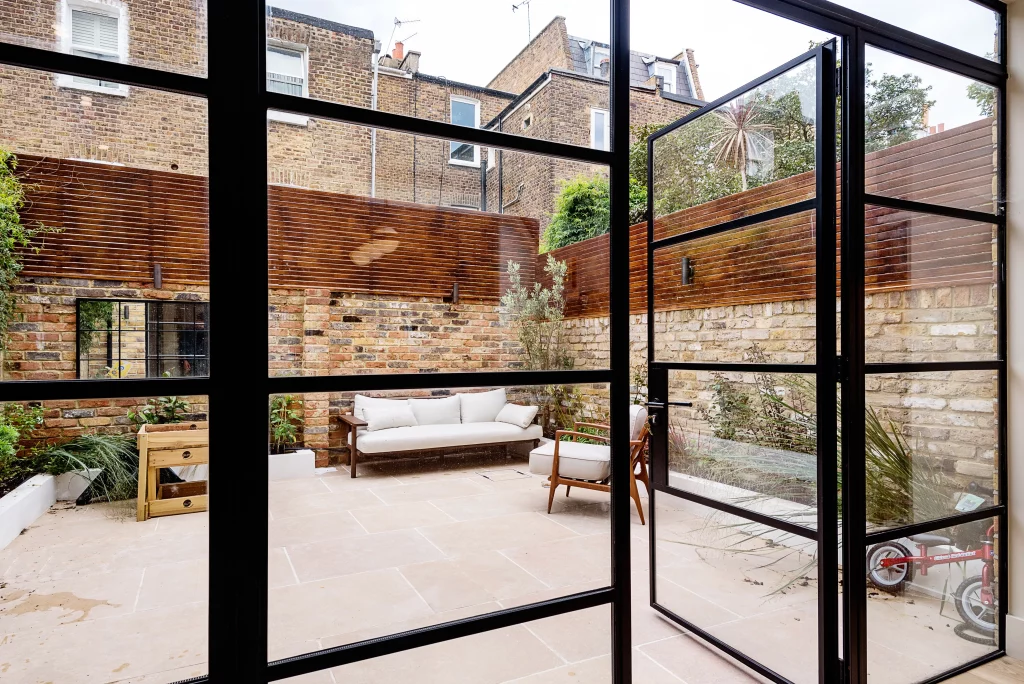
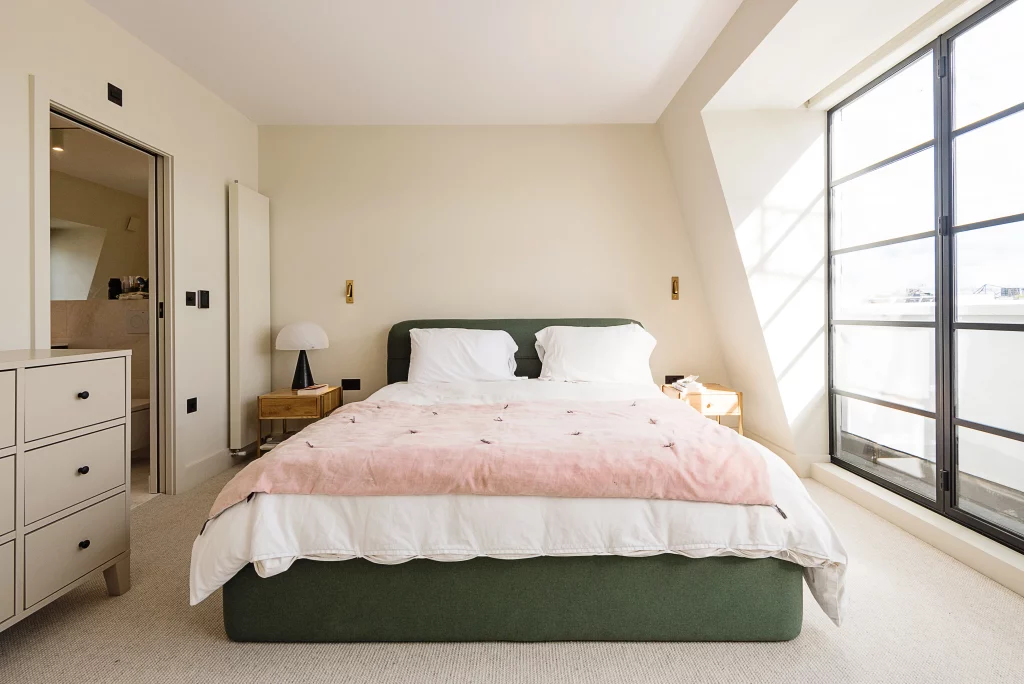
The Fittra Process: Smooth, Stress-Free, and Efficient
The Fittra process is a five-step action plan that we’ve refined and perfected over the years. From day one, we are there to take the reigns, ensuring a stress-free journey. However, we’ll never make decisions without your say-so. Here’s a snapshot of what we do.
Free Consultation and Full Architectural Design
We start all projects with a free consultation on-site. During this meeting, we’ll ask you some straightforward about your extension. If you need help with architectural design, we can help to provide that service.
Once the meeting has concluded and you’re ready to proceed, we’ll begin our official proposal. This will be a comprehensive but easy-to-digest document between 12 and 18 pages. We will then give you time and space to make your decision independently.
Project Management and Legal Support
Once the project is underway, our experienced team will handle everything with professionalism, involving you at each step. We’re available at all times as consultants, even when it comes to legal issues.
Client Satisfaction: Our Portfolio Speaks for Itself
At Fittra, we pride ourselves on delivering a high-end product on time and on budget. If you need further convincing, check out our client testimonials.
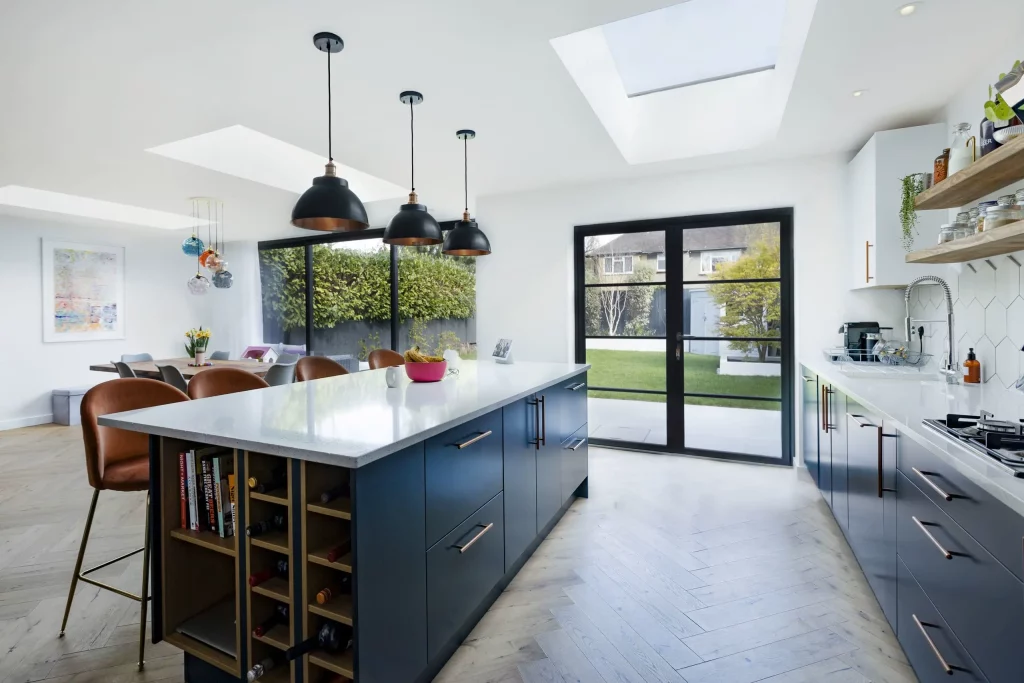
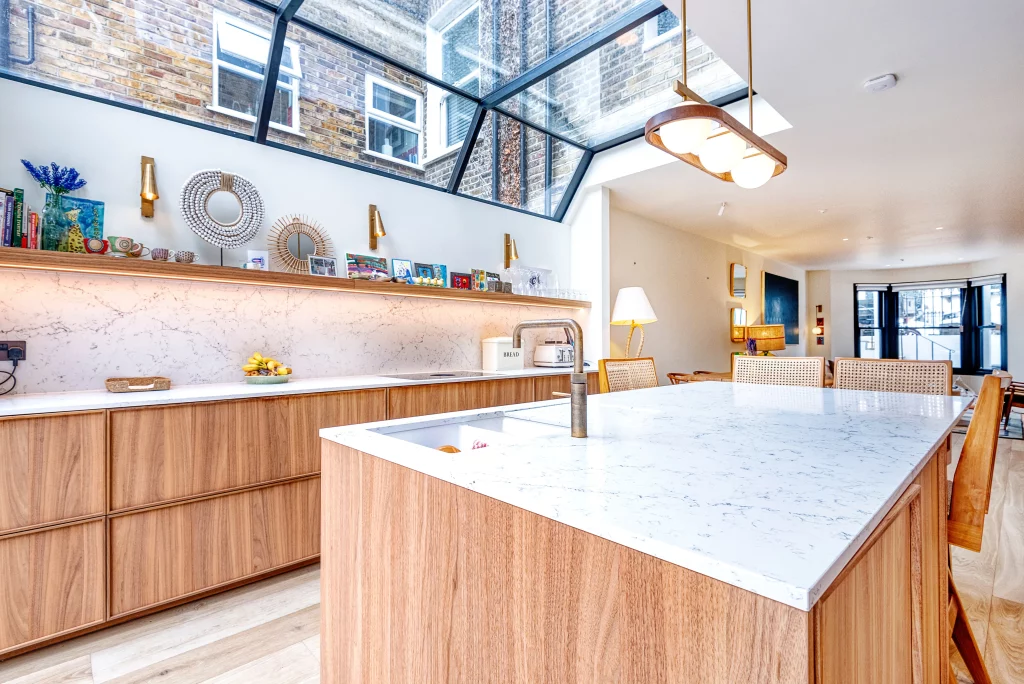
Conclusion
With Fittra, there are no guessing games. Our quality services and transparent processes ensure a first-rate experience from our first consultation. When we wrap up your extension, we’ll make sure to complete all snagging and provide you with warranties and certificates.
The best part? Our tried and tested approach allows us to offer competitive prices. We take our work seriously and client satisfaction is the number one priority.
Summarizing the Cost of Extensions
Estimating the cost of an extension in the UK is the first, and one of the most important steps in the entire process. Getting a professional building company, like Fittra, on board at this time can help ensure your estimations are accurate and that you stay on budget throughout the project.
Extension costs vary depending on the project size and type, the location of your property, and the materials you choose. However, you must also consider things like planning permission, legal fees, architectural costs, and VAT.
There’s always a way to save money and get the most out of your extension, like hiring experienced builders to guide you through the process.
Making the Right Decision for Your Home
Armed with the knowledge of extension processes and costs, all that’s left to do is make a decision. Regardless of what direction you’re leaning, we invite you to schedule a consultation with Fittra. It won’t cost you a penny and it could help you on the way to creating your dream home.
Reach out with any queries via email, phone call, or through the form on our website.
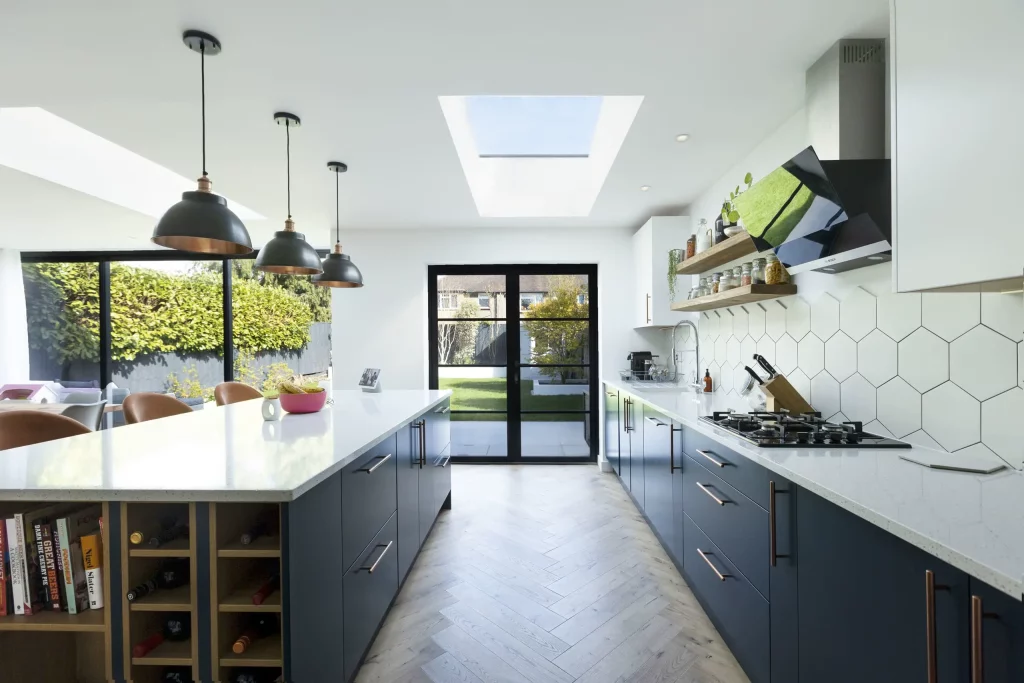
PAY ONLY FOR WORK THAT HAS BEEN DONE!
Why Work With US
FREE CONSULTATION
at all stages
24/7 COMMUNICATION
with project manager
£10M EMPLOYER’S
liability insurance
FREE SCHEDULE
of works
Integrated, In-house Team Will Work On Your Project
In the End You Will Get
A HIGH-END PRODUCT DELIVERED ON TIME AND ON BUDGET!
SEE WHAT PEOPLE ARE SAYING
Testimonials
Our Projects
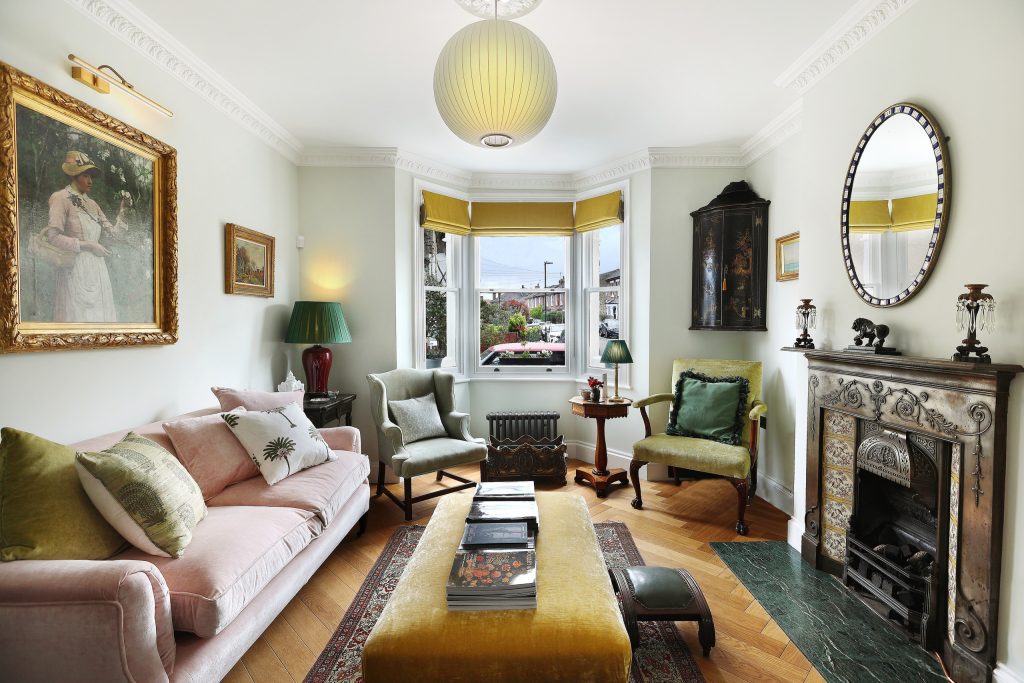
Twickenham Renovation: Where History Meets Modern Elegance
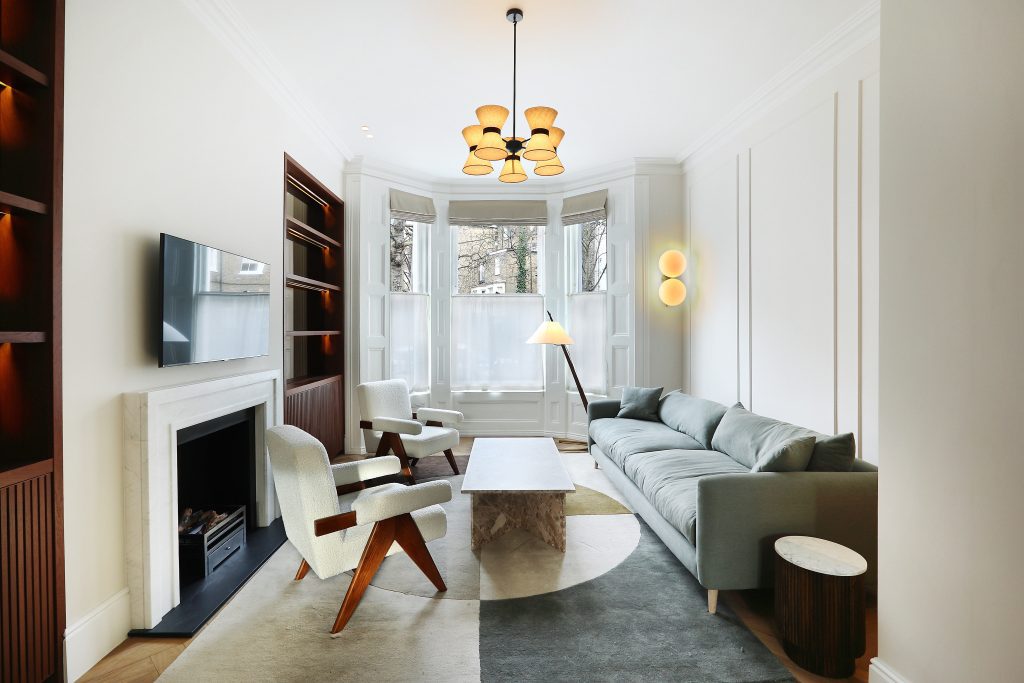
Earls Court Transformation: Luxury Living Redefined
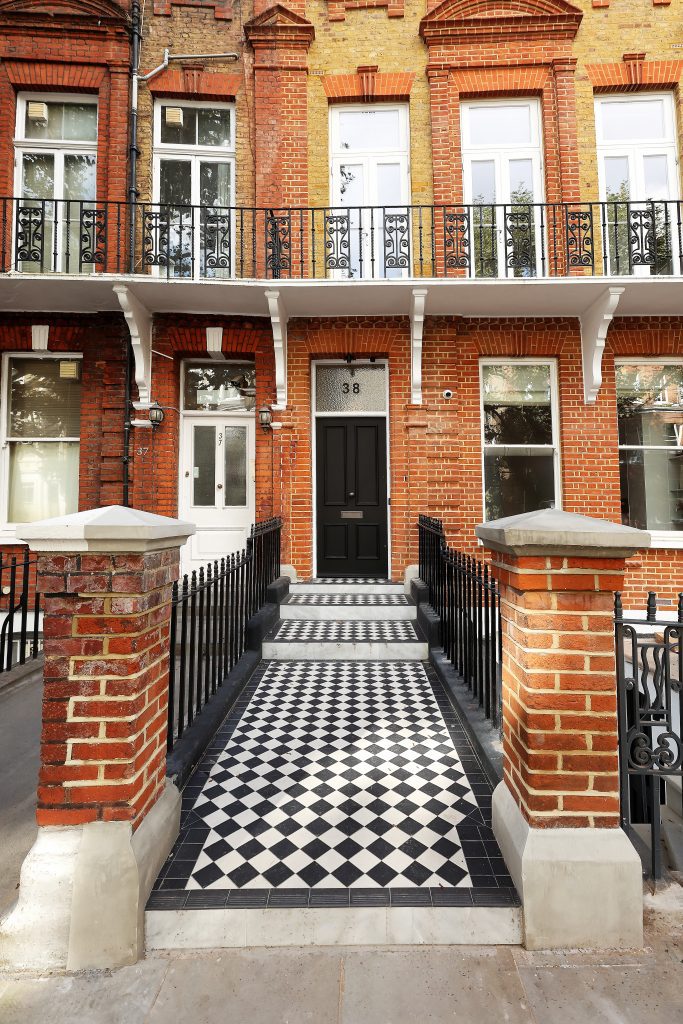
Earls Court Transformation: Luxury Living
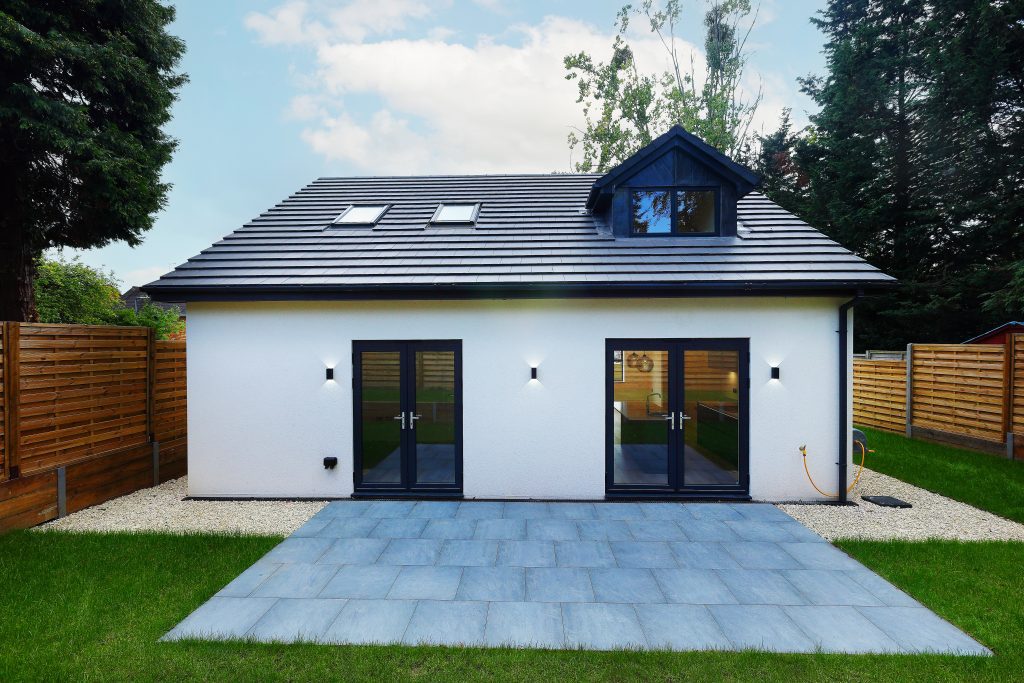
Slough
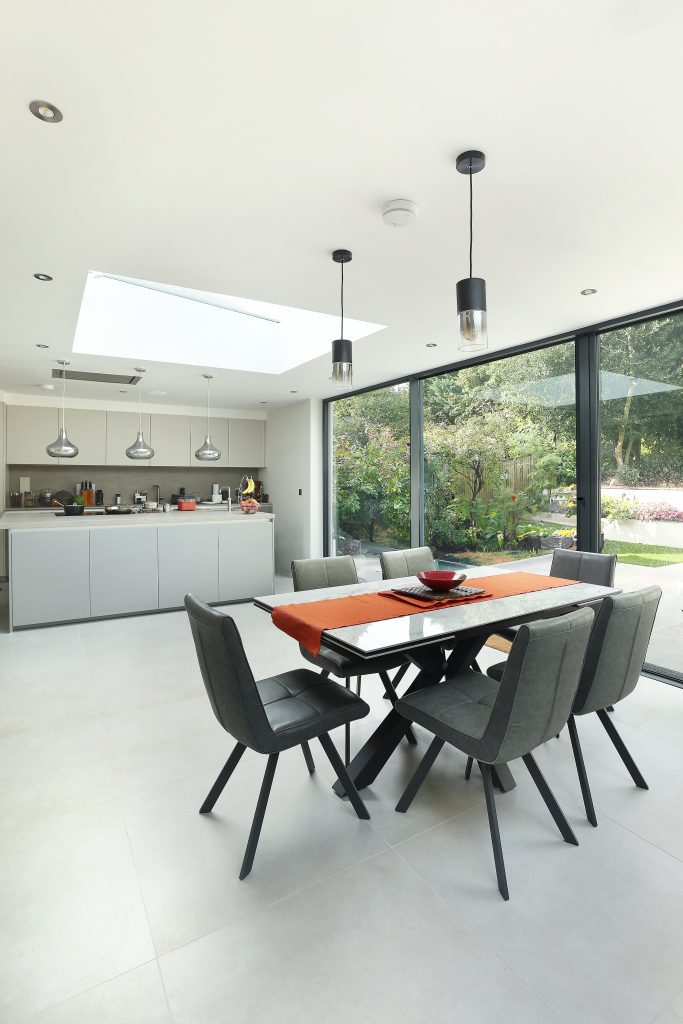
Raynes Park
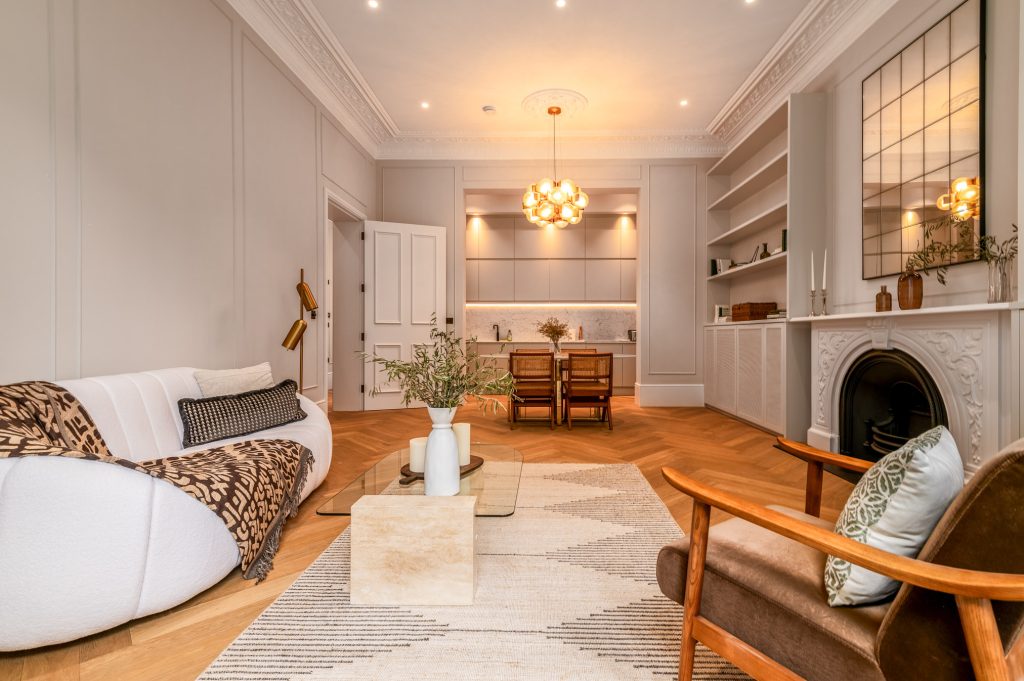
West Brompton

Chelsea
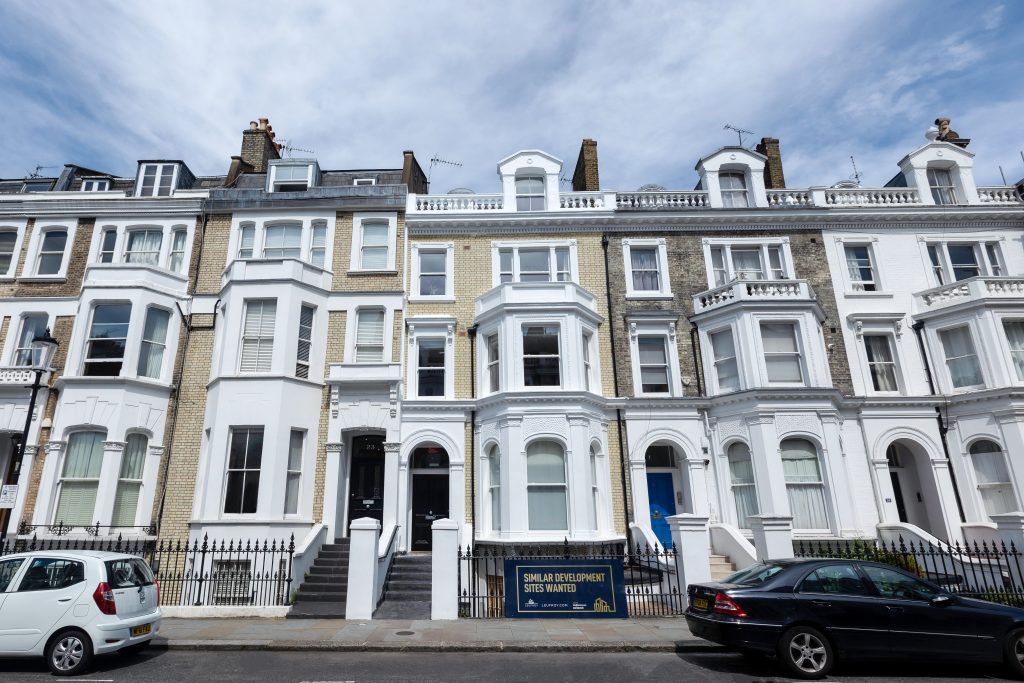
Brompton
FAQ: Answering Your Key Questions
If you still have questions regarding house extension costs in the UK, don’t worry. We’ve assembled a list of our most frequently asked questions, ensuring no stone is left unturned.
How much does an extension cost in the UK?
How much does it cost? A UK extension can cost anywhere between £22,000 and £100,000. However, a common small extension can cost as little as £15,000. A medium size single storey extension (30m2 to 40m2) usually costs between £40,000 and £60,00).
How much does a house extension cost per m2?
The cost per square per meter varies. However, a single story extension, one of the most typical add-ons in the UK, usually costs between £1,000 and £4,600 per m2, giving you an average of £2,800 per m2.
How much will my extension cost?
Extension costs in the UK depend on several factors, like size, building type, site location, and materials. However, the average mid-size project usually costs between £30,000 and £40,000 from start to finish. You can use an extension cost calculator for a more accurate estimate, or give us a call.
How to calculate house extension cost?
The best approach to calculating your extension cost is to get an estimation of the extension price per m2. Since the average cost per m2 is £2,800, simply multiply this number by the size of your planned extension (in m2).
How much does a structural engineer cost for a house extension?
Structural engineer costs vary depending on who you choose. Some charge based on what they’re inspecting on the site, while others have a flat fee. £1,000 per project is a standard cost, but it’s common for structural engineers to charge between £500 and £2,000.
Leave message and we’ll contact you back
Work time
Mon-Fr: 8.00 am – 5.00 pm
Sat: 8.00 am – 1.30 pm
Adress
London
Park Parade Gunnersbury Avenue, W3 9BD
Contacts